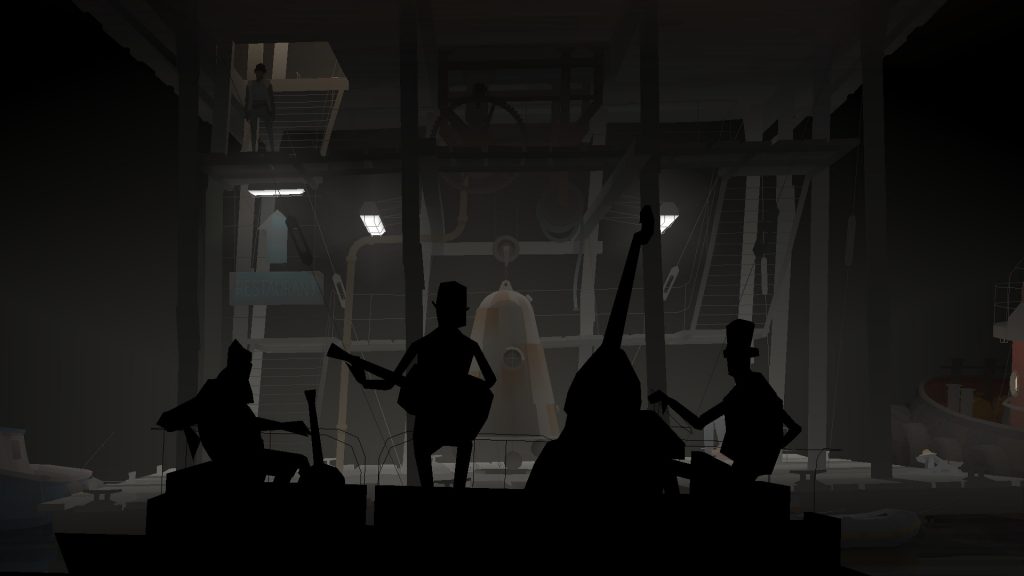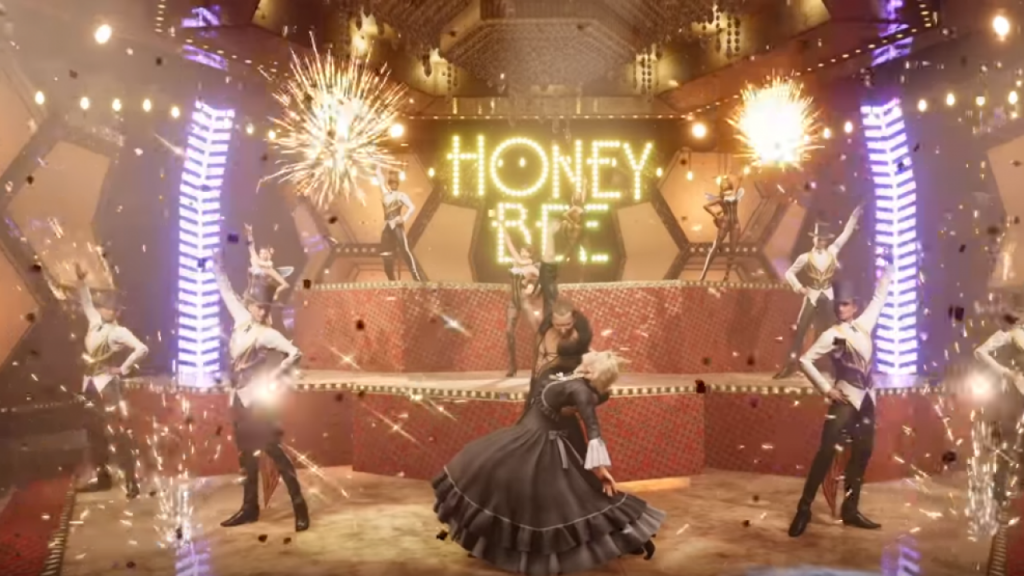late-game spoilers for AI: The Somnium Files and World’s End Club
The idea of a “video game musical” has plagued my thoughts ever since I learned a social-media-famous anecdote about Tetsuya Nomura coming back from a viewing of the movie version of Les Misérables and wanting to turn Final Fantasy XV (slash Versus XIII) into a musical.
Of course, I’ve since learned that that anecdote was exaggerated for effect, as are most anecdotes you’ll find on social media. But I’ve still thought about that alternate universe where Noctis and the boys sing their way through their roadtrip with curiosity and no small amount of longing. It sounds wonderful.
I should clarify, I’m not talking about music/rhythm games like Rhythm Heaven or the Persona dancing games – I’m talking about a video game musical. One that’s literally structured like what you’d see on Broadway. One where instead of scenes of dialogue, we get songs and dances. Where the music is part of the plot.
So I’m going to lay out the few games that approach a musical structure, and the ways it enhances the experience of those games. Just for fun, and to illustrate the potential of such a creation so maybe someone, anyone, will take up this idea. Please?
Kingdom Hearts

Speaking of Nomura…
Kingdom Hearts has some pretty infamous musical integration. It started with the Atlantica rhythm game in Kingdom Hearts 2, then it continued with the inclusion of songs in Kingdom Hearts 3’s Arendelle, specifically the extended scene of Let It Go.
Neither of these sections are particularly beloved by Kingdom Hearts fans. But they’re memorable, for sure, locked into the collective experience of those who played. Regardless of how you feel about the execution of music in these games so far, I think there’s a lot of potential for stuff like this in Kingdom Hearts.
Like, I would have loved it if Frozen had had more songs. Genuinely! Lean into it. Make Donald Duck’s voice actor belt out a new chorus of Let It Go. What were the other songs in that movie? Do You Wanna Build A Snowman? Goofy can sing that.
I mean, Sora, Donald, and Goofy often change physical form to fit in during their visits to each world. Let’s say that this time, they are magically induced to sing when other characters break out in song. It’s a rule of the world. Force Larxene to sing. That’s comedy.
Musicals are a somewhat “cringe” artform, because they’re deeply sincere. It doesn’t really matter what the musical is about – telling your story through song and dance numbers can’t be anything but sincere at its core. Musicals that are embarrassed, self–hating, or soulless don’t work.
Kingdom Hearts shares some of that DNA. It’s immune to cringe. If it was ever embarrassed of itself, it wouldn’t work anymore. I’m not saying Kingdom Hearts should go full musical (although honestly? Nomura, feel free). But considering Sora and co. visit musical worlds already, there’s plenty of room to let them belt out some tunes once again.
Kentucky Route Zero

For a more artistic route, let’s look at Kentucky Route Zero.
This game wears theater on its sleeve. Its environments are often designed like sets. There’s one entire interlude that’s simply the performance of a play. If you return to the gas station in Act I, you continue to run in to a struggling stage director throughout your journey.
Of course, it also has text adventure games and art installations and news shows too – Kentucky Route Zero is inspired by a lot of things – but theater underpins the whole aesthetic of the game.
It also uses music to emphasize and underpin pivotal moments of the story. A mysterious trio of folk singers follow your party around, often appearing in the foreground while your characters move around in the back. The roof lifts off a grimy bar as Johnny and Junebug play their magical show. Ezra collects sounds to back up a theremin performance at the end of Act 4. A chorus is sung over a funeral in Act 5.
It’s not exactly a musical. With the odd exception, such as the video above, the main cast don’t sing. And the songs are only indirectly about their feelings or the current plot. A smaller point, but religious folk is also not often what you hear on stage.
But these songs are still an integral part of the game’s storytelling. They create musical moments like a star actor belting out the show-stopping ballad. The feeling there is the same, even if the execution doesn’t match. As I said at the start: there’s already a lot of overlap between theater and games which often goes unexplored, but this game lays those shared influences bare.
Just make the songs a touch more straightforward, assign them to members of the cast, and you could easily make a real stage musical out of this game.
World’s End Club/AI Somnium Files

Most people who know of Kotaro Uchikoshi probably associate him first with the Zero Escape series. I admire that series greatly (and with caveats), but it’s actually two of his more recent games I want to look at, since they both lean into the idea of a musical with total sincerity and straightforward execution.
AI: The Somnium Files features an idol named Iris as one of its main characters. Her song “Invincible Rainbow Arrow” features several times throughout that game in both the waking world and within her subconscious dreams. The true ending remixes the song into a group number in which most of the main cast participates, singing about where they are now and how they’re feeling about that. There’s even synchronized dancing.
This is a full musical number within a game. You literally can imagine the curtain closing on their final synchronized pose.
World’s End Club doesn’t go quite as hard as AI, but it also has a pivotal, plot-relevant song that features several remixes. The Go Getter’s Club Theme is a way for the kids to express their unity with each other. Near the end of the game, they sing it to one of their members in order to bring him back from under the enemy’s control. Their feelings are so big that they manifest into song – one of the trademarks of a musical’s structure.
Musicals (typically) need more than one song, but I think AI and WEC offer the best current examples of a Broadway musical number. The songs are in-universe, feature set pieces that sometimes include dancing, and even serve to advance the plot at points.
I would love to see Uchikoshi take on making a full musical. I really believe in his ability to helm a project like that. For now, I just have to hope Nirvana Initiative at least gets one ending number, just like AI.
Other Examples

Final Fantasy VII Remake’s Honeybee Inn scene is probably the next closest musical moment after AI and World’s End Club, with the song-and-dance performance on stage and the concentrated glitz and glam capturing that musical vibe. I thought about giving this its own section, but I probably would have just repeated a lot of the same points captured in the previous one.
Square Enix in general loves a good needle drop – despite usually being pop songs, there’s something to that tactical deployment of music that hits right. Such as the “Stand By Me” intro in FFXV for instance. Man, I wish they’d made that game a musical…
And, of course, there are musical game that aren’t structured exactly the same as a Broadway musical, but aren’t straightforward rhythm games either. Genesis Noir and Sayonara Wild Hearts, for example, are more like playable albums.. Upcoming games like Unbeatable, We Are OFK, and Afterlove EP also look like they might fit under this category.
Conclusions
As I think I made clear during the section on Kentucky Route Zero, I’ve always thought that there’s an interesting overlap between games and theater. I’ve brought it up on the podcast a few times throughout the years. Think about the gamified nature of things like improv, the group performance of playing a tabletop game, the way players enact and embody a character through their controller inputs, etc etc…
And yet, despite the obvious crossovers, it’s rare to see games take overt inspiration from any theatrical trappings, let alone musicals. As such, there’s nothing exactly like what I want so far as I can see on the horizon. Until the day comes that someone finally brings these elements together in harmony, I’ll just have to keep taking the scraps where I can get it.
I look forward to seeing that day come!
